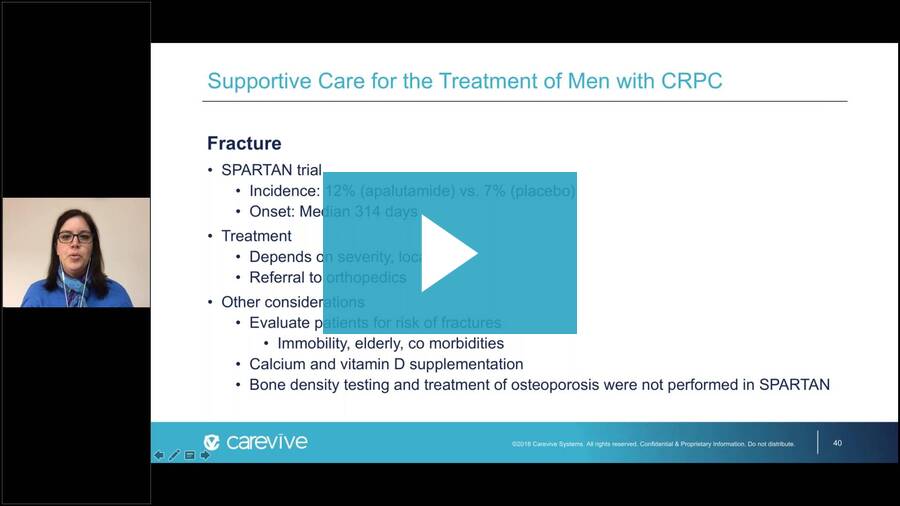
NOT FOR CME/CREDIT FOR REFERENCE ONLY
Recorded On
Thursday, December 6th, 2018
1:00 – 2:00 pm EST
In 2018, there will be an estimated 164,690 new cases of prostate cancer (PC) in the U.S. and approximately 29,430 patients will die of the disease, making it the third-leading cause of cancer death in men (American Cancer Society [ACS], 2018). The majority of men with PC are treated with curative intent (i.e., with radical prostatectomy or radiation therapy) with good outcomes, but a fraction of men with locoregional PC will develop progressive disease. Men who have initial PSA/biochemical recurrence after curative treatment are a heterogeneous group of individuals with good overall prognosis, including a median metastasis-free survival (MFS) >8 years and a median overall survival (OS) of >23 years (Rozet et al., 2016).
Approximately 10%-20% of prostate cancer patients develop castration-resistant PC (CRPC) within approximately 5 years of follow-up. Decisions about clinical management (i.e., when to start treatment) are challenging because it is unclear which patients will have shorter versus longer survival, and metastatic disease is not always reliably detected with imaging (Rozet et al., 2016).
Multiple new targeted agents, including immunotherapy, second-generation hormone therapy, and androgen biosynthesis inhibitors have been recently approved. Two recently published studies (PROSPER and SPARTAN) have changed the standard of care for patients with nmCRPC.
Learning Objectives
At the conclusion of this educational initiative, participants should be able to:
- Utilize new data regarding the evidence-based management of patients with nmCRPC
- Discuss implications of decisions regarding timing and treatment sequencing for patients with nmCRPC on subsequent therapy
- Identify ongoing late phase clinical trials in nmCRPC
- Implement strategies to manage education and symptoms for men with nmCRPC
Faculty

Adjunct Faculty
University of North Carolina, School of Nursing

Division of Medical Oncology, Department of Medicine
Duke Cancer Institute
Webinar Agenda (All times in EST)
One-Hour Webcast Topics:
| 1:00 – 1:25 pm | Evolving Evidence-Based Treatment Paradigms for nmCRPC (including late-stage clinical trials for nmCRPC) | Megan McNamara, MD |
| 1:25 – 1:50 pm | Supportive Care for the Treatment of men with CRPC | Mary W. Dunn, RN, MSN, OCN, NP-C |
| 1:50 – 2:00 pm | Question & Answer Session | Panel and webinar participants |
Who Should Attend?
This activity is intended for urologists, medical oncologists, urology/oncology nurses, and nurse navigators.
Joint Accreditation Statement

Physician Continuing Medical Education
The Postgraduate Institute for Medicine designates this live activity for a maximum of 1.0 AMA PRA Category 1 Credit™. Physicians should claim only the credit commensurate with the extent of their participation in the activity.
Continuing Nursing Education
The maximum number of hours awarded for this Continuing Nursing Education activity is 1.0 contact hours. Pharmacotherapy contact hours for Advance Practice Registered Nurses to be determined.
Disclosure of Conflicts of Interest
Postgraduate Institute for Medicine (PIM) requires instructors, planners, managers and other individuals who are in a position to control the content of this activity to disclose any real or apparent conflict of interest (COI) they may have as related to the content of this activity. All identified COI are thoroughly vetted and resolved according to PIM policy. The existence or absence of COI for everyone in a position to control content will be disclosed to participants prior to the start of each activity.
Faculty reported the following financial relationships or relationships to products or devices they or their spouse/life partner have with commercial interests related to the content of this CME activity:
Faculty Disclosures
Megan McNamara, MD Contracted Research: Funds directed towards institution from Bayer, Janssen, Clovis, Agensys, and Seattle Genetics; Speaker’s Bureau: Bayer
Mary W. Dunn, NP has no real or apparent conflicts of interest to report.
Planners and Managers
The PIM planners and managers have nothing to disclose. The Carevive planners and managers have nothing to disclose.
Fee Information
There is no fee for this educational activity.
This activity is supported by an independent educational grant from Astellas.
Jointly provided by Postgraduate Institute for Medicine and Carevive Systems, Inc.


